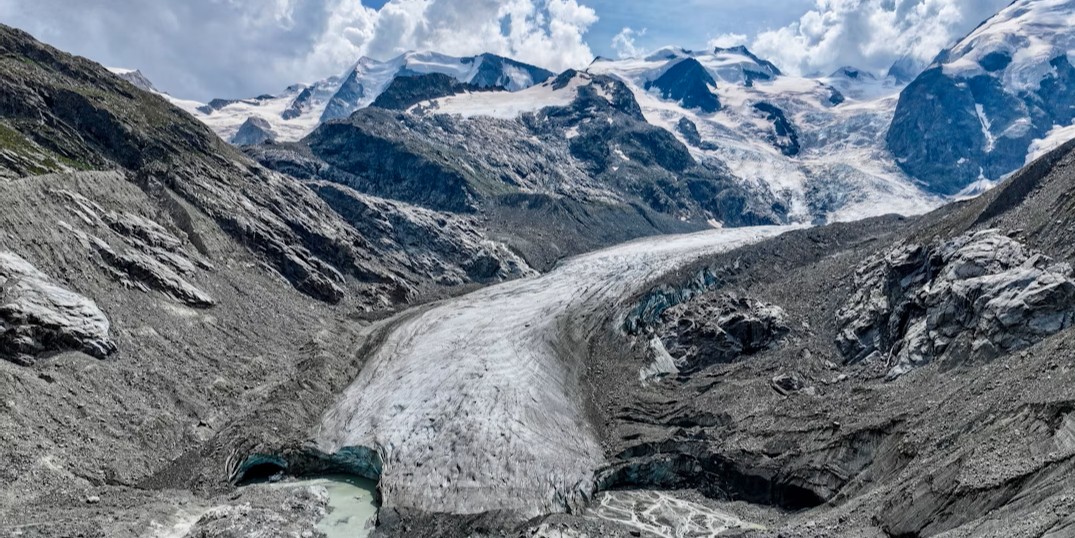Swiss glaciers have suffered a significant and alarming loss in 2025, with nearly 3% of their volume melting away over the course of the year. This dramatic decline has sparked concern about the accelerating effects of climate change on the alpine region. The main factors behind this rapid ice loss are an unusually snow-poor winter and extreme heatwaves that swept through the region during the summer months, significantly contributing to the glaciers’ retreat.
The loss of nearly 3% of the glaciers’ total volume in just one year is a stark reminder of the ongoing changes happening in the climate system. Such a rapid retreat is unprecedented in recent history and marks a sharp acceleration in the melting process. Some glaciers have experienced a loss of more than two meters of ice thickness within a single season, further underlining the severity of the situation. This rapid depletion of ice raises serious concerns not only about the fate of Switzerland’s glaciers but also about the broader implications for the environment, ecosystems, and communities that depend on them.
The combination of a snow-poor winter, which reduced the accumulation of ice and snow that usually builds up during colder months, and scorching heatwaves during the summer created the perfect conditions for accelerated melting. These unusual weather patterns are reflective of the larger climate changes that have been observed across the globe, where rising temperatures have resulted in more frequent and intense heatwaves, as well as altered precipitation patterns. For the Swiss Alps, the loss of snow and ice at such an alarming rate is a clear indication that the glaciers, which have been around for thousands of years, are now highly vulnerable to global warming.
Swiss glaciers have historically been reliable indicators of climate change, with their gradual retreat offering a clear visual record of the warming that has taken place over the past century. The rate of melting has accelerated over the past few decades, and 2025 marks one of the most significant years in recent history for ice loss. The shrinking glaciers are not just an environmental concern—they also pose serious risks to the regions dependent on them. Glaciers act as natural water reservoirs, storing water that is gradually released into rivers throughout the year. As these glaciers shrink, however, the volume of water they provide decreases, potentially threatening water availability for agriculture, hydropower, and drinking supplies, particularly during the warmer months when the demand for water is highest.
The loss of glacial ice also contributes to rising sea levels, a global issue with far-reaching consequences for coastal communities. As glaciers melt, they add more freshwater into the oceans, causing sea levels to rise, which threatens coastal infrastructure, ecosystems, and human populations living near the shore. This connection between glacial melt and sea-level rise underscores the global nature of the climate crisis and the urgency of addressing it.
In addition to the environmental and economic risks posed by melting glaciers, there are also profound cultural and social implications. Switzerland’s glaciers attract millions of tourists each year, with visitors coming from around the world to hike, ski, and experience the beauty of the alpine landscape. As glaciers continue to retreat, the viability of these industries could be compromised, leading to significant economic losses in mountain towns and regions that rely on tourism as a key industry.
As the glaciers of Switzerland and other mountainous regions around the world continue to retreat at such rapid rates, the situation calls for urgent global action to mitigate the causes of climate change. The melting of these glaciers is not just a local issue for Switzerland—it’s a global one. It serves as a stark reminder of the need for immediate and comprehensive climate policies that can help slow down or reverse the damage that has already been done. Scientists and environmentalists continue to stress the importance of reducing carbon emissions and transitioning to renewable energy sources to prevent further warming and to protect the delicate ecosystems and communities that rely on glaciers.
The loss of nearly 3% of the volume of Swiss glaciers in 2025 is an unprecedented event in the country’s history, one that underscores the urgent need for a global response to the climate crisis. As the effects of global warming continue to manifest in more dramatic and unpredictable ways, it is increasingly clear that preserving the world’s glaciers, and the freshwater resources they provide, requires immediate and decisive action to combat climate change on a global scale.

